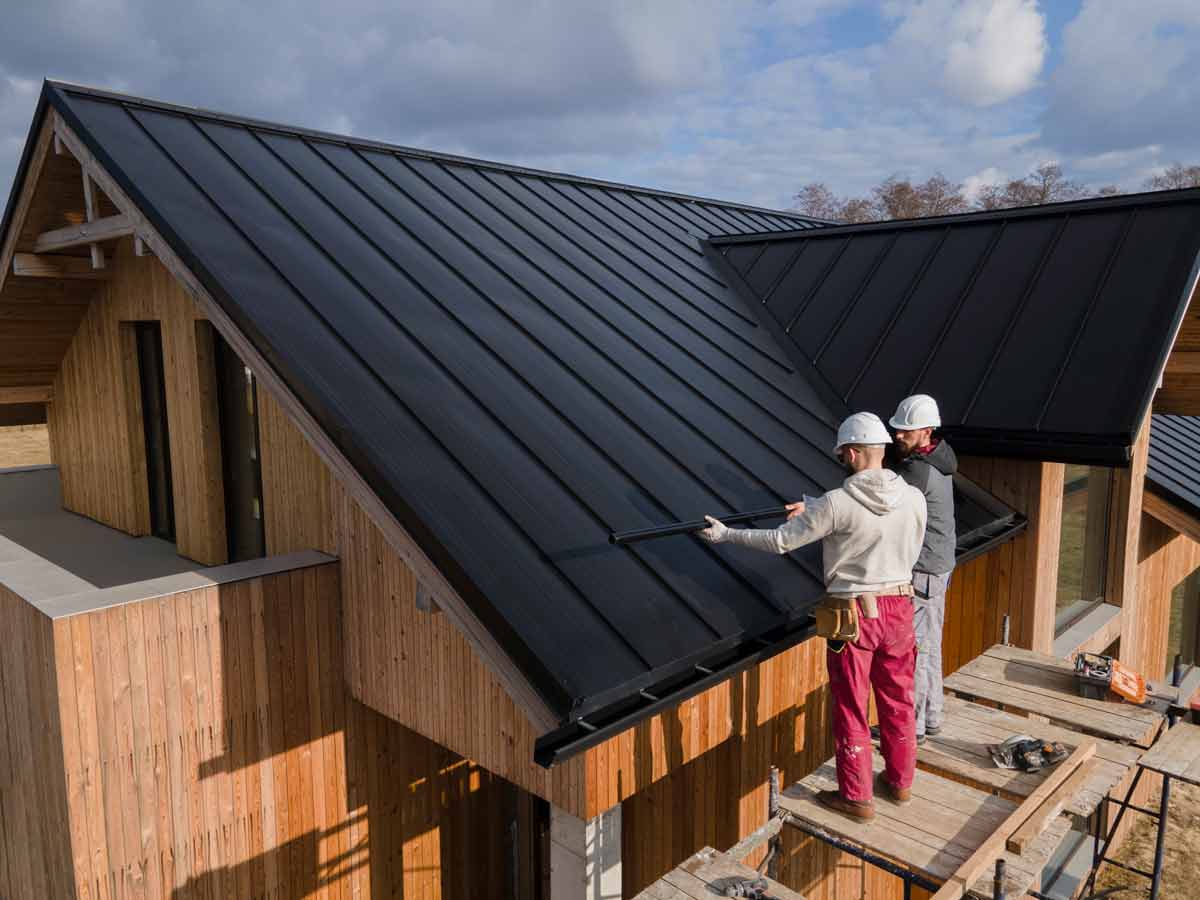- Free Estimates

✔ Personal referrals are often the most reliable starting point when searching for a roofer.
✔ Always verify licensing, insurance, and online reviews before hiring.
✔ Get multiple detailed estimates to compare pricing, materials, and timelines fairly.
✔ Asking the right questions during interviews reveals a contractor’s true experience.
✔ Manufacturer certifications like GAF or Owens Corning signal training and reliability.
✔ A strong roofing contract should clearly outline scope, cost, timeline, and warranties.
✔ Choosing a local, certified roofer is key to finding the best roofing contractor in Hyde Park.
Hiring a roofing contractor in Hyde Park can quickly turn into a headache when promises fall short and repairs don’t last. Missed deadlines, poor communication, and unexpected costs are just a few of the common complaints homeowners face. Trust is earned—not assumed—and knowing how to find a good roofing contractor takes more than a quick Google search.
Here are five essential steps to make sure the next roofer hired is the right one.
The best place to begin isn’t online—it’s in the neighborhood. Friends, family, and neighbors who’ve recently had roofing work done can offer honest insight into their experience. Personal referrals help cut through the noise and get closer to how to find a good roofing contractor.
A little homework upfront can save a lot of frustration later. Looking beyond flashy websites or sales pitches helps filter out unreliable contractors early. This step is key in how to find the best roofing contractor with a solid track record.
One quote isn’t enough to judge a contractor’s pricing or approach. Getting several estimates reveals who’s being transparent—and who’s hoping the homeowner won’t notice vague details.
Meeting with a contractor isn’t just about hearing a pitch—it’s a chance to dig into how they operate. The right questions reveal whether a roofer is experienced, honest, and detail-oriented. This is critical in how to choose the right roofing contractor before signing anything.
Before a single shingle is touched, everything needs to be in writing. A clear contract protects both sides and helps avoid misunderstandings that lead to delays or disputes. Reading carefully is one of the smartest steps in how to choose the right roofing contractor.
Roof repairs can work for minor issues, but some problems run deeper than patchwork can fix. Knowing when to move from repair to full replacement is key to protecting the home and making smart financial decisions.
Slate, tile, and metal roofs can last decades, but asphalt shingles often show their age after 20 years. If repairs are becoming more frequent, replacement may be more cost-effective than constant patching. In cases like this, how to choose the right roofing contractor becomes especially important for long-term value.
If leaks return after multiple repairs or show up in new spots, the system may be failing altogether. Water often finds new pathways when underlayment is worn or flashing is compromised across large sections. Understanding how to find a good roofing contractor is critical when leaks signal deeper structural issues.
One or two damaged pieces can be replaced, but widespread surface damage means the roof can no longer protect the home effectively. This level of wear is a strong sign that repairs won’t hold up in future storms. It’s time to start thinking about how to find the best roofing contractor who can assess and replace the full system.
For asphalt roofs, loose granules in gutters mean the protective surface is deteriorating. This leads to quicker sun and water damage, even if shingles still appear intact from the ground. Homeowners should look into how to choose the right roofing contractor before more serious issues set in.
A sagging roofline or soft sections underfoot suggest underlying rot or structural failure. This is more than a surface issue—it often involves decking or framing damage. Knowing how to find a good roofing contractor with structural experience is key when replacement becomes unavoidable.
Patches from different times and materials can make a roof look uneven and reduce curb appeal. More importantly, too many repairs can weaken overall performance and void manufacturer warranties. In these cases, knowing how to find the best roofing contractor means choosing someone who can install a system built to last.

As of 2025, roof replacement costs $9,517 on average, making it a major investment that deserves careful consideration. Budgeting for a roofing project in Hyde Park, NY, can be a major undertaking, especially given the range of material choices, labor costs, and unforeseen repairs that may arise.
Segmenting your budget into specific cost categories helps identify where you can save and where you may need to spend more.
Roofing projects often uncover hidden issues once the work begins. Allocating funds for surprises ensures you’re not caught off guard.
If your roofing project exceeds available cash, consider various financing paths that won’t strain your monthly budget.
The market size of the roofing contractors industry in the U.S. reached $75.8 billion in 2024, reflecting just how much homeowners invest in roofing services each year. However, hiring the wrong roofing contractor can lead to costly mistakes, safety hazards, and legal issues. Knowing what red flags to watch for can help you steer clear of unreliable or dishonest roofers.
One of the first things you should check is whether the contractor is properly licensed and insured. A legitimate roofing professional should have no problem providing proof of licensing that meets state or local requirements. Additionally, they must carry liability insurance and workers’ compensation coverage to protect both you and their workers.
If a contractor is pushing you to sign a contract on the spot or claims an offer is only good for today, proceed with caution. High-pressure sales tactics are often used to prevent homeowners from taking time to compare estimates or do their due diligence. A trustworthy contractor will give you the time and space to make an informed decision without rushing you into a commitment.
While it’s natural to want the best deal, an estimate that seems drastically lower than others should raise suspicion. These lowball offers often cut corners on materials, labor, or both—and may not include critical elements like proper flashing, underlayment, or cleanup. In some cases, contractors start with an attractive price, only to tack on “unexpected” charges once work begins. If the bid seems too good to be true, it probably is.
Communication is a cornerstone of any successful roofing project. If a contractor is difficult to reach, avoids answering questions, or is generally dismissive or disrespectful, that behavior is unlikely to improve after the job starts. Reputable roofers maintain a professional tone, respond promptly, and are upfront about timelines, expectations, and potential issues.
While a deposit is standard practice, no reputable roofing contractor should ask for the entire payment before work begins. Asking for full payment upfront puts you at risk of unfinished or poor-quality work. The safest payment structure involves milestone payments tied to completed phases of the job.
Any experienced roofing contractor should be able to provide a portfolio of past work and references from satisfied clients. If they dodge these requests or seem hesitant to share examples, that may be a sign they lack experience—or worse, have a track record they’d rather you didn’t see. Always take the time to look up reviews online and verify their reputation.
While some general contractors offer roofing services, it’s safer to work with a licensed roofing specialist. Roofers who focus solely on roofing systems are more likely to meet manufacturer standards and local code requirements. When learning how to find a good roofing contractor, look for someone with roofing-specific experience and certifications—not just general construction skills.
Roof repairs can technically happen year-round, but spring and fall usually offer the best weather conditions. During the off-season, some contractors may have more availability and offer flexible scheduling. Knowing how to find the best roofing contractor includes asking when they recommend starting the project based on weather and workload.
While it’s not required, being available during the first day of the job can help answer questions and ensure everything starts smoothly. Some homeowners choose to check in periodically without staying home all day. It’s another way to stay involved and shows how to choose the right roofing contractor who welcomes communication throughout the project.
A good contract will include a process for “change orders” that outlines how new issues are priced and approved. Experienced contractors communicate clearly and won’t proceed with major changes without consent. This is why understanding how to find a good roofing contractor means choosing someone who’s honest when surprises happen.
While it’s tempting to handle some cleanup or prep to reduce costs, roofing is dangerous and technically complex. Most contractors prefer to manage the full job to avoid liability and ensure warranty eligibility. To avoid conflicts or voided warranties, it’s best to focus on how to find the best roofing contractor who offers a full-service approach.

Roofing Experts of Hyde Park has earned a strong reputation by delivering honest quotes, expert craftsmanship, and dependable service across Hyde Park, NY. Whether it’s time for a full roof replacement or help figuring out how to find a good roofing contractor, our experienced team makes the process clear and manageable. With a focus on communication and real accountability, we take the frustration out of roofing projects—one home at a time.
Reach out today and work with professionals who treat every roof like it protects their own.